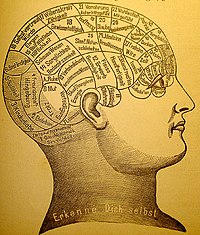
Photo from wikipedia
Is it possible to directly perceive others’ mental states? Mediating the debate between Direct Perception and Inferentialism proponents would require knowing “what counts as an inference and how to tell… Click to show full abstract
Is it possible to directly perceive others’ mental states? Mediating the debate between Direct Perception and Inferentialism proponents would require knowing “what counts as an inference and how to tell the difference between inferential and non-inferential processing” [1]. However, few theorists have even attempted to answer the question of what counts as inference. The consequence, as noted by Spaulding [1], is that “given that neither Inferentialists nor DSP [Direct Social Perception, Ed.] proponents specify what they mean by inference, it is hard to tell what exactly each side is affirming and denying. Thus, the debate between Inferentialism and DSP is at an impasse”. Similar considerations apply to distinguishing between what is ‘observable’ versus ‘unobservable’ [2]. The motivation for the work discussed in the target article [2] was partly to reconceptualize the notion of ‘direct perception’ to make the observability of others’ mental states empirically addressable. This resulted in the proposal to reformulate ‘direct perception’ as reflecting the conditional probability of perceiving a given mental state from the observation of certain movement features. We do not claim that this formulation resolves the issue of whether perception of others’ mental states involves inferential steps. As noted by Overgaard [3], in principle, a stimulus may contain discriminatory information about a mental state, the information may be perceptually useful, while identifying the mental state could still involve ‘inferential’ steps. This argument brings us back to the initial impasse of what counts as inference. More radically, one
Journal Title: Physics of life reviews
Year Published: 2018
Link to full text (if available)
Share on Social Media: Sign Up to like & get
recommendations!